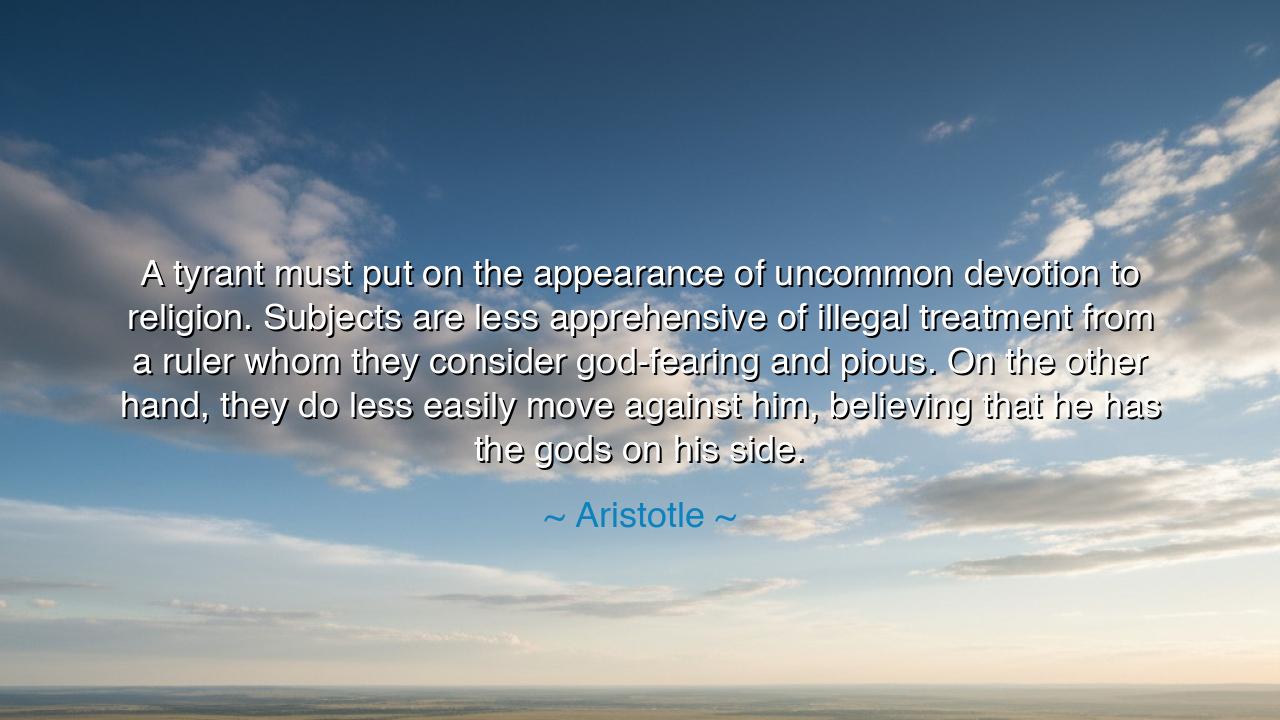
A tyrant must put on the appearance of uncommon devotion to
A tyrant must put on the appearance of uncommon devotion to religion. Subjects are less apprehensive of illegal treatment from a ruler whom they consider god-fearing and pious. On the other hand, they do less easily move against him, believing that he has the gods on his side.






“A tyrant must put on the appearance of uncommon devotion to religion. Subjects are less apprehensive of illegal treatment from a ruler whom they consider god-fearing and pious. On the other hand, they do less easily move against him, believing that he has the gods on his side.” Thus spoke Aristotle, the philosopher of wisdom and balance, whose mind pierced through the veils of power to expose the hidden engines of tyranny. In this profound observation, he warns humankind of one of the most dangerous masks in all of history — the mask of piety worn by the tyrant. For in every age, there are rulers who understand that men fear the gods, and that by cloaking cruelty in holiness, they can enslave both body and soul.
In these words, Aristotle draws not from fancy, but from the bitter truth of human nature. He lived in the shadow of Greek city-states where tyranny often rose from the ashes of liberty. He saw how men, though free in spirit, could be deceived when authority cloaked itself in divine sanction. The tyrant, he teaches, does not begin by brandishing his sword, but by bowing his head. He kneels before altars, speaks softly of virtue, and calls upon heaven to bless his rule — while his heart plots the enslavement of those who believe him righteous. For he knows that faith is the deepest root of loyalty, and that men who trust in their ruler’s holiness will surrender their freedom with open hands.
History is rich with such examples. Consider King Henry VIII of England, who declared himself the head of the Church to secure both his throne and his desires. To the people, he appeared as God’s chosen monarch, defending faith against corruption; yet in truth, he used religion as a weapon to silence dissent and justify tyranny. Priests who defied him were executed, monasteries were burned, and power became the new altar. The people, bound by their belief that the king acted under divine authority, were slow to resist — for who dares raise a hand against one who claims the favor of heaven? Thus, as Aristotle warned, the appearance of piety became a tool of oppression.
But Aristotle’s teaching is not merely a political lesson; it is a mirror for the soul of every generation. For tyranny is not born only in palaces — it arises wherever power manipulates belief. When a leader claims holiness to hide corruption, when religion is used to divide rather than uplift, when fear of the divine is turned into obedience to men — there, tyranny reigns. The philosopher unmasks this deceit and reminds us that true virtue needs no disguise, for it shines by its own light. The righteous do not proclaim their holiness; their deeds reveal it.
Yet, the blame does not rest on the tyrant alone. Aristotle, in his wisdom, knew that a people who fail to question appearances become accomplices to their own enslavement. The citizens who see piety and mistake it for justice, who hear sacred words and forget to judge the deeds behind them, become like those who follow the shadow rather than the sun. To live wisely, therefore, is to look beyond the surface — to test the heart of every leader not by their prayers, but by their actions. For the gods, if they watch at all, care not for words spoken in temples, but for justice done among men.
Consider the example of Marcus Aurelius, the philosopher-king of Rome, who showed that piety and power can coexist in harmony only when humility guides authority. Though an emperor, he never used religion to bind his people, but to guide himself. He wrote, “Waste no more time arguing what a good man should be. Be one.” His rule was marked not by divine pretense, but by wisdom and compassion. Thus, Aristotle’s warning is not against faith itself, but against the corruption of faith for power’s sake. When religion uplifts the soul, it liberates; when it serves ambition, it enslaves.
So, my child, take this teaching and guard it well. When you see those who rule — in kingdoms, in temples, or in hearts — claiming to act for heaven, look first at whether their actions bring peace or fear. Beware the one who demands worship for himself while speaking in the name of God. The true servant of the divine has no need to boast of holiness; he carries it quietly, as a light carried through the darkness. Trust not the appearance of piety, but the fruits of it. For power that must wear the mask of faith is already corrupt, and faith that serves power ceases to be holy.
And thus, Aristotle’s wisdom endures like a flame through the centuries. It calls us to awaken our reason, to see through the glitter of false sanctity, and to remember that the gods are not in the crowns of kings, but in the conscience of the just. Let this be your shield against deception: discernment. For tyranny begins not with force, but with illusion — and the moment we see clearly, its spell is broken.






AAdministratorAdministrator
Welcome, honored guests. Please leave a comment, we will respond soon